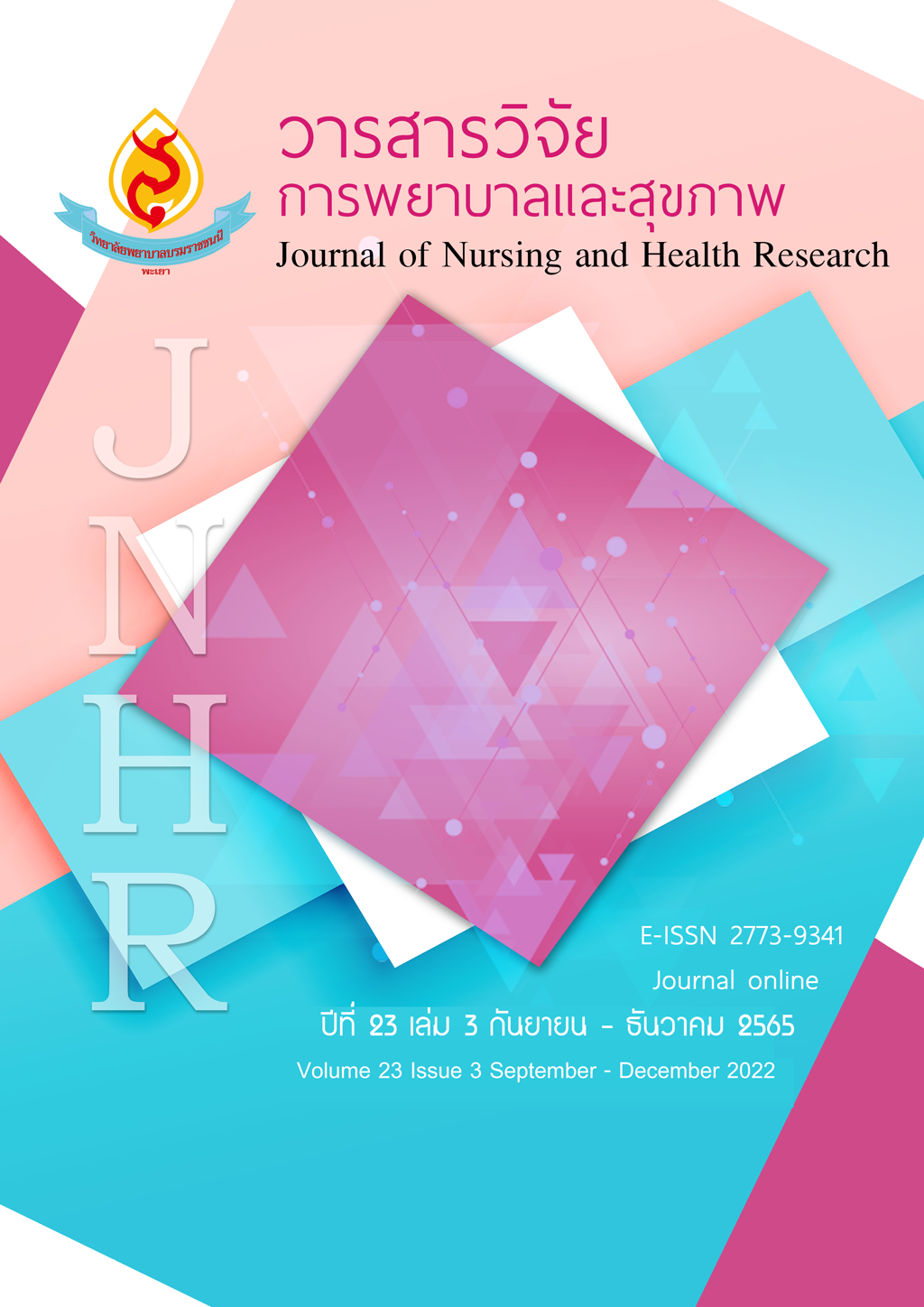จริยธรรมในการสอนของอาจารย์พยาบาลตามการรับรู้ของนักศึกษาพยาบาล
คำสำคัญ:
จริยธรรมการสอน, อาจารย์พยาบาล, นักศึกษาพยาบาลบทคัดย่อ
อาจารย์พยาบาลเป็นบุคลากรที่มีบทบาทสำคัญในการผลิตพยาบาลเข้าสู่ระบบบริการสุขภาพ ดังนั้น อาจารย์พยาบาลจะต้องยึดมั่นและปฏิบัติการสอนอย่างมีจริยธรรมเพื่อเป็นแบบอย่างที่ดีให้แก่นักศึกษา การวิจัยนี้เป็นการวิจัยเชิงพรรณนาเพื่อศึกษาจริยธรรมในการสอนของอาจารย์พยาบาล และเปรียบเทียบจริยธรรมในการสอน ของอาจารย์พยาบาลตามการรับรู้ของนักศึกษาพยาบาลชั้นปีที่ 2-4 กลุ่มตัวอย่างเป็นนักศึกษาพยาบาลชั้นปีที่ 2-4 ในปีการศึกษา 2564 ของวิทยาลัยพยาบาลแห่งหนึ่งในภาคเหนือจำนวน 282 คน เครื่องมือที่ใช้ในการวิจัยประกอบด้วย แบบสอบถามข้อมูลทั่วไป และแบบสอบถามจริยธรรมในการสอนของอาจารย์พยาบาล ที่มีค่าความตรงตามเนื้อหา เท่ากับ .90 และทดสอบความเชื่อมั่นของเครื่องมือมีค่าสัมประสิทธิ์แอลฟาของครอนบาค เท่ากับ .91 วิเคราะห์ข้อมูลด้วยสถิติเชิงพรรณนา และสถิติครัสคาล-วัลลิส ผลการวิจัย พบว่า คะแนนเฉลี่ยจริยธรรมในการสอนของอาจารย์พยาบาลโดยรวมอยู่ในระดับดี ( =4.33, SD=.54) โดยจริยธรรมการสอนทุกด้านอยู่ในระดับดี ด้านที่คะแนนเฉลี่ยมากที่สุดคือ หลักการพูดหรือการบอกความจริง (
=4.37, SD=.56) และด้านที่คะแนนน้อยที่สุดคือ หลักการเคารพเอกสิทธิ์ (
=4.30, SD=.61) ส่วนผลการเปรียบเทียบความแตกต่างค่ามัธยฐานจริยธรรมในการสอนของอาจารย์พยาบาลของนักศึกษาชั้นปีที่ 2-4 พบว่า จริยธรรมในการสอนของอาจารย์พยาบาลด้านหลักการทำประโยชน์ หลักการไม่ทำอันตราย หลักความยุติธรรม หลักการพูดหรือการบอกความจริง และหลักความซื่อสัตย์ ไม่แตกต่างกัน ส่วนจริยธรรมการสอนด้านหลักการเคารพเอกสิทธิ์ในนักศึกษาพยาบาลชั้นปีที่ 2-4 มีความแตกต่างกันอย่างมีนัยสำคัญทางสถิติ (p<.05) ผลการศึกษาสามารถใช้เป็นแนวทางในการส่งเสริมและพัฒนาจริยธรรมในการสอนของอาจารย์พยาบาลโดยกำหนดเป็นนโยบายด้านการจัดการเรียนการสอนให้อาจารย์ปฏิบัติตามหลักจริยธรรมการสอนทุกด้าน รวมถึงกำหนดให้มีเนื้อหาด้านจริยธรรมการสอนในการปฐมนิเทศอาจารย์ใหม่และส่งเสริมพฤติกรรมที่แสดงออกอย่างเหมาะสมกับนักศึกษา
เอกสารอ้างอิง
กนกวรรณ ฉันธนะมงคล. (2563). จริยธรรมทางการพยาบาล (พิมพ์ครั้งที่2). กรุงเทพฯ: สำนักพิมพ์จุฬาลงกรณ์มหาวิทยาลัย.
งานวัดและประเมินผล วิทยาลัยพยาบาลบรมราชชนนี พะเยา. (2563). สรุปผลการประเมินประสิทธิภาพการสอนของอาจารย์ประจำปีการศึกษา 2563 [บันทึกข้อความ]. วิทยาลัยพยาบาล.
ประกาศกระทรวงศึกษาธิการ เรื่อง มาตรฐานคุณวุฒิระดับปริญญาตรี สาขาพยาบาลศาสตร์ พ.ศ. 2560. (วันที่ 6 พฤศจิกายน 2560). ราชกิจจานุเบกษา. เล่มที่ 135 ตอนพิเศษ 1 ง, หน้า 7.
ประวีดา คำแดง. (2564). การสอนภาคปฏิบัติในคลินิกตามความคาดหวังของนักศึกษาพยาบาล. วารสารสมาคมพยาบาลแห่งประเทศไทยสาขาภาคเหนือ. 27(1), 17-28.
ปาริชาติ โรจน์พลากร-กู๊ช และยุวดี ฤาชา. (2549). สถิติ สำหรับงานวิจัยทางการพยาบาลและการใช้โปรแกรม SPSS for Windows. กรุงเทพฯ. บริษัท จุดทอง จำกัด.
ภาวิณี ศรีสันต์. (2562).จริยธรรมในการสอนของอาจารย์พยาบาลตามการรับรู้ของนักศึกษาพยาบาล มหาวิทยาลัยราชธานี. วารสารราชธานีนวัตกรรมทางวิทยาศาสตร์สุขภาพ, 2(3), 18-31.
มณีรัตน์ ภาคธูป และกัลยา ศารทูลทัต. (2561). การขาดแคลนและการคงอยู่ของอาจารย์พยาบาลในสถาบันการศึกษา. วารสารการพยาบาลและการศึกษา, 11(3), 1-9.
วิทยาลัยพยาบาลบรมราชชนนี พะเยา. (2560). มคอ.2 รายละเอียดของหลักสูตรพยาบาลศาสตรบัณฑิตหลักสูตรปรับปรุง พ.ศ.2560. พะเยา: วิทยาลัยพยาบาลบรมราชชนนี พะเยา สถาบันพระบรมราชชนก.
วิลาวรรณ คริสต์รักษา, พิมพ์พนิต ภาศรี, สรณ สุวรรณเรืองศรี และเพ็ญพิชชา ถิ่นแก้ว. (2563). คุณลักษณะของอาจารย์ที่พึงประสงค์ในรายวิชาปฏิบัติการพยาบาลขั้นพื้นฐานตามความคาดหวังของนักศึกษาพยาบาลชั้นปีที่ 2 มหาวิทยาลัยสงขลานครินทร์. วารสารสงขลานครินทร์, 40(3), 139-148.
วิไลวรรณ ทองเจริญ, สุชาติ ตันธนะเดชา และปทีป เมธาคุณวุฒิ. (2553). องค์ประกอบและตัวบ่งชี้มาตรฐานวิชาชีพอาจารย์พยาบาล. วารสารพยาบาลศาสตร์, 28(4), 55-66.
ศิริรัตน์ สุกีธรม, พยอม อยู่สวัสดิ์, ยุวดี วัฒนานนท์, ทัศนีย์วรรณ พฤกษาเมธานันท์, วชิรา วรรณสถิต และเบญจวรรณ คุณรัตนาภรณ์. (2544). การดูแลเอาใจใส่ในกระบวนการสอนภาคปฏิบัติของอาจารย์พยาบาลตามการรับรู้ของนักศึกษาพยาบาล คณะพยาบาลศาสตร์ มหาวิทยาลัยมหิดล. วารสารสภาการพยาบาล, 16(4), 28-37.
สภาการพยาบาล. (2558). คูมือสงเสริมจริยธรรมสําหรับองคกรพยาบาล: กลไกและการปฏิบัติ.กรุงเทพฯ: จุดทอง.
สืบตระกูล ตันตลานุกูล และปราโมทย์ วงค์สวัสดิ์. (2560). ความเครียดและการจัดการความเครียดของนักศึกษาพยาบาล. วารสารวิทยาลัยพยาบาลบรมราชชนนี อุตรดิตถ์, 9(1), 81-92.
สุพิศ รุ่งเรืองศรี และอุดมรัตน์ สงวนศิริธรรม. (2558). อาจารย์พยาบาล:ความท้าทายต่อสมรรถนะส่วนบุคคล. พยาบาลสาร, 42(ฉบับพิเศษ). 214-222.
อติญาณ์ ศรเกษตริน, ดาราวรรณ รองเมือง และรุ่งนภา จันทรา. (2562). การศึกษาพยาบาลในศตวรรษที่ 21: สมรรถนะและบทบาทของอาจารย์พยาบาล. วารสารพยาบาลทหารบก, 20(1), 12-20.
อรัญญา เชาวลิต และทัศนีย์ นะแส. (2559). จริยธรรมในการสอนหลักสูตรพยาบาลศาสตรบัณฑิต. วารสารพยาบาลสงขลานครินทร์, 36(3), 261-270.
Salminen, L., Stolt, M., Metsämäki, R., Rinne, J., Kasen, A., & Leino-Kilpi, H. (2016). Ethical principles in the work of nurse educator—A cross-sectional study. Nurse Education Today, 36, 18–22.
Safarpour, H., Varasteh, S., Malekyan, L., Ghazanfarabadi, M., Allahabadi, M. S., Khoshab, H., ... Fuladvandi, M. (2022). Uncivil behaviors in nursing education from the perspectives of nursing instructors and students: A cross-sectional study. International Journal of Africa Nursing Sciences, 17, 100444.
Savage, J. S. & Favret, J. O. (2006). Nursing students’ perceptions of ethical behavior in undergraduate nursing faculty. Nurse Education in Practice, 6(1), 47-54.
ดาวน์โหลด
เผยแพร่แล้ว
รูปแบบการอ้างอิง
ฉบับ
ประเภทบทความ
สัญญาอนุญาต
ลิขสิทธิ์ (c) 2022 วารสารวิจัยการพยาบาลและสุขภาพ

อนุญาตภายใต้เงื่อนไข Creative Commons Attribution-NonCommercial-NoDerivatives 4.0 International License.



